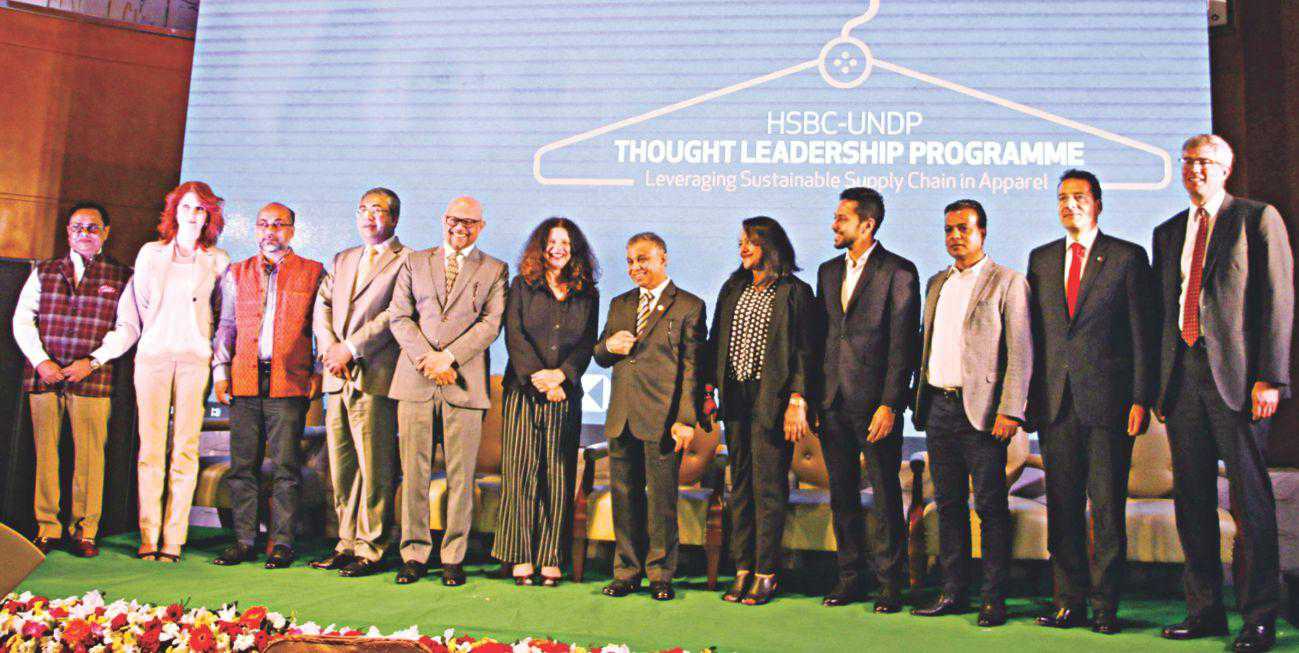Apparel industry building sustainable businesses

Markets earlier used to solely depend on supply and demand, and the prices and profit were contingent upon these forces. However, the emerging trends of the global economy are disrupting the economy in ways where businesses need to adapt to the increasingly informed consumers, agile digital competitors, and new customer segments brought by the connectivity of information technology.
The first industrial revolution used water and steam power to mechanise production. The second used electric power to create mass production. The third used electronics and information technology to automate the production process. Now the fourth industrial revolution is building on the third and it is a digital revolution that synthesises its preceding revolutions.
As Bangladesh aims to progress to a middle-income country, its stakeholders need to align with the above trend to sustain its development in the long-term. This means: creating an ecosystem that nurtures innovative entrepreneurs who can compete on the world stage; empowering youth that will be the next generation of the workforce; preventing jobless growth; and finally, growing business with broader social and environmental awareness.
Private and public stakeholders who foresee this necessity have started to convene to align themselves in re-designing the economy, as exemplified by the Thought Leadership programme by Hongkong and Shanghai Banking Corporation (HSBC) and the United Nations Development Programme (UNDP). The programme also congregated leading established businesses in the apparel industry and stakeholders of the supply chain.
Bangladeshi apparel industry is a quintessential part of the national economy, constituting more than 10 percent of the GDP, 80 percent of earnings from exports, and well over one-third of the employment.
The apparel industry has come a long way during the past two decades, wherein it has the highest number of green factories and half of the factories have effluent treatment plants.
The Accord and the Alliance, the two Western buyers' platforms working to improve workplace safety in Bangladesh readymade garment sector, have completed their tenure and the industry remains in positive rating.
However, challenges remain in measuring and communicating these positive changes to the export destinations, as well as continuously exploring new business models that ensure growth through the fourth industrial revolution. For the apparel sector specifically, the new economy has created a new customer segment, distribution model, and shareholders.
New digital technology is connecting and informing communities and consumers who are demanding transparency and accountability while having access to several outlet channels that are directly linked to suppliers. NGOs have emerged as supporters of distribution and production models through their livelihood generation and capacity building programme that can support goods consignment scheme or new market outreach. Smaller companies are becoming more agile and competitive with the adoption of latest technologies and personalisation.
These new opportunities and risks represent a shift in how financial value is generated – profit lies not in merely reducing cost and mass-producing merchandise, but in having an inclusive business model to accommodate the increasingly connected and complex economy where businesses need to address the social aspect and consequences of their business beyond price tags and machines.
"Innovation is not necessarily a new invention. Innovation becomes the structural transformation of the ecosystem when best practices raise awareness," said Linda Germanis, project manager of the UNDP Innovation Hub, while presenting the keynote at the Thought Leadership programme.
The list of examples of financial value in sustainable practice goes on: increasing productivity through capacity building; offering decent work for employee retention and lower absenteeism; certifying good practices; and sourcing responsibly to mitigate risk.
A best example is H&M Plus, which aims to utilise 100 percent recyclable products as part of the company's endeavour to create a circular economy and lower the risks of climate change.
DBL is inspiring others to set up fair price shops, and SMEs like Sokhipad are introducing business models with established corporate houses.
The two companies are part of the platform “Business Call to Action”, yet another manifestation of the more significant trend of convergence of stakeholders and socio-economic values. Through the platform, which can be accessed through UNDP Bangladesh country office, businesses can become a member to gain global visibility, impact measurement and planning services, and technical advisory in inclusive business model design.
HSBC's sustainability strategy, on the other hand, is working to reduce the environmental impact of its clients' supply chain.
Transformational change is taking place where new customer engagement, new investment areas and subsequently investment vehicle, and new partnerships are being forged.
Institutions, businesses, and people are shaping a different future of the different economic system where profit will be generated through shared and agreed upon values of society and community, as opposed to the previous and linear process of consumerism.
Source: https://www.dhakatribune.com